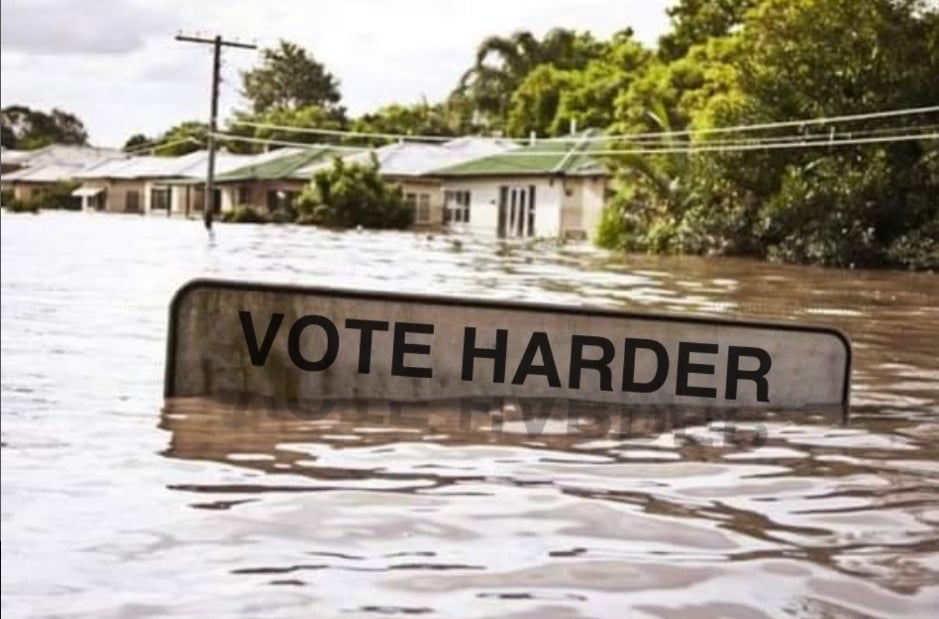“my guy is great but the rest of those crooks…”
“my crook is great but the rest of these crooks…”
FTFY.
Plenty of voters KNOW their representatives are crooks. But they’re crooks on the “right side”, so they’re cool. They’re using their crookedness to push law through ethically void means that often border on legality, which is fine so long as they’re usually pushing their constituents agenda in doing so OR simply fucking over the other side. Those people voting for Jewish Space Lasers Marj and Child Sex Trafficking Gaetz know exactly who those people are, as do every single Twice-Impeached, Convicted Felon Trump voter. It’s not an awareness issue.
Another factor is the idea that all politicians are crooks, making perceived crookedness seem irrelevant. This becomes a self fulfilling prophecy.
Also that almost every election is a choice between a crook who’ll implement the policies you want, and a crook who won’t.
Politics in general is a self fulfilling prophesy. Genuine, honest people who stand for something and want to make a positive change through integrity and compromise do not typically last long in politics. Those who are ruthless have the advantage and those who are not either need to recognize, defy and outnumber the ruthless, or else fall to their level, or fail to see the change they’re fighting for. The job just incentivizes being a lying asshole.
Simple solutions. Term limits, ranked choice voting, delete the electoral college.
The problem is that while people disapprove of Congress as a whole they tend to like their own representatives.
Gerrymandering is a bigger problem in Congress.
Ranked-choice means nothing if you have single-member districts, other than maybe allowing some third parties to get in. You can still gerrymander and stuff.
What you really want is multi-member districts or just nationwide PR, but that is anything but simple…
Yeah, 96% of RCV elections in the US elect the first round winner anyway. In part because proportional representation is the ultimate goal, I think Approval Voting is a better first step towards fixing our elections. You can very easily adapt it to proportional methods in ways that the voter can actually understand. Fargo and St. Louis use it for their normal elections and it’s caused majority winners to go way up. It elected the first black woman to mayor for St. Louis, so that’s pretty neat.
Interesting, do you have any resources on adapting Approval to proportionality (i.e. for parliamentary elections)? I don’t see how you could allocate based on total vote share without party lists (if only a few candidates get a vast, vast majority, you have a bunch of seats to fill). Does allocation to the top n winners approach proportionality?
As far as parliamentary elections go I think STV is good if you don’t have parties and (MM/OL/CL)PR if you do.
There’s two main ways you can do it, which you pick depends on the things you care about. The first is to just say that a voter can cast as many votes as they like, but that the weight of their ballot is divided by the number of votes they cast. So if a voter selects N candidates, then each candidate gets 1/N votes towards their total. Top vote-getters win. This method is very simple and easy to understand, but it does encourage voters to strongly limit their support, since each vote they cast dilutes the power of the rest of their votes. In fact, going from 1 choice to 2 is the biggest drop off in terms of support for your candidates.
So you say to yourself “I’d rather not punish people for voting for as many candidates as they like, but I don’t want one party to win all the seats if they have a slight majority support.” Well okay, let’s assign seats sequentially then using Sequential Proportional Approval Voting. Voters pick any number of candidates and the votes are added up. Top candidate gets the first seat. Then, for every ballot with W winners on it, its value is assigned to 1/(W+1). For the first round no ballot can have any winners, so all ballots count the same. For the second round, some have weight 1 and others weight 1/2. In the third round 1, 1/2, and 1/3. Then 1, 1/2, 1/3, and 1/4. You get the idea. The aim here is to allow voters to support c andidates that are unlikely to win, since the number of votes they cast doesn’t impact their vote weight. But, as a voter gains more and more representatives in office, their ballot is weighed less and less, since they should be more and more satisfied with their representation.
As a simple example, if there were three parties with R=45%, G=43%, and B=12% support, and all voters voted for only their party, the seats would be awarded as follows:
- R (R=100% G=0% B=0%)
- G (R=50% G=50% B=0%)
- R (R=67% G=33% B=0%)
- G (R=50% G=50% B=0%)
- B (R=40% G=40% B=20%)
- R (R=50% G=33% B=17%)
- B (R=43% G=43% B=014%)
- And so on and so forth
As with any proportional method the more seats you award the more true to the correct proportion the awarded seats become. This method makes it much more reasonable to vote for everyone you like, but it also discourages insincere votes because if that candidate gets awarded a seat all the rest of your votes just became worth less in all the following rounds.
Honestly any reasonable proportional method with a big enough seat pool is just about as good as any other. I like using the approval method since the voter is presented with a ridiculously simple ballot (you literally can’t fill in the bubbles wrong) and they can functionally ignore the counting method knowing that whatever the election is, voting for everyone they like is a pretty reasonable strategy. Slightly more optimal strategies exist if you know the polling data and what kind of election you’re voting in, but “everyone you like” is still a very good one.
“simple”
Yes, simple. Easy to explain to the average person, easy to implement. Now, as for our overlords with all the money allowing it? Complicated.
RCV is completed enough that it’s causing disenfranchisement problems with poor and low education voters. Better to go with approval voting, which gets the same results while making invalid ballots impossible.
The way we make that happen is by starting with local referendums and working our way up. It’s a lot of work, but it’s the main way good stuff happens in our democracy.
That abstract describes disenfranchisement due to overvote, which is choosing more candidates than allowed. If these fucking morons cannot follow directions, they likely are too stupid to be trusted to vote. I’d rather that type of self culling than the current methods.
Now, try saying that about Florida in 2000. You know, “butterfly ballots” and all.
It is near impossible. The super majority required is insanely difficult to get.
It’s the kind of change you don’t ask for permission to change. I don’t think the system is capable of reforming itself.
Majority voting system is the main problem. Electoral college is the version for presidential elections, but it needs to be changed to a proportionate voting system for congress as well.
As the US is very state-based, you could do a version like Germany where you vote for a local candidate as well but the proportion of the congress equals the whole proportion of votes.While I agree with these, removing the electoral college wouldn’t have a direct impact on congress, right?
It would have an indirect impact by not allowing an orange fuck by winning without the popular vote.
It could change the VP (tie breaking vote in Senate)
The electoral college has nothing to do with electing legislators (it is only used for the presidency), and alternative voting methods to go to are great but don’t do shit if the candidate is running unopposed (and a lot of these chucklefucks are).
Every neoliberal:

What are you proposing? A revolution?
Yes.
How far did you read about the French Revolution before you closed the book? Because it certainly seems like you read the part about overthrowing the rich and then stopped reading about what happened next.
Let’s be honest: nobody actually reads history. If they did they would know that the citizens of Paris eventually burned the guillotine because it had killed so many people.
Are you doing the work to make it happen or just waiting for one to come around?
Besides, voting until (lol) it happens would make a ton of sense.
What do you know about the leftist attitude towards revolution vs adventurism?
Please elaborate
How would one “do the work” for creating a revolution? Do you understand what revolutionary leftists actually advocate for?
I’m asking you what you are doing to create it, by asking like that it sounds like you’re not doing anything
No, just to make sure the little bubble on the ballot is really well colored in.
“No just vote! but vote for a Democrat of course…” ~ average neoliberal
~ average leftist who understands the voting mechanism.
Vote Democrat until “You’re voting 3rd party? Everyone knows D and R are the only viable options” becomes “You’re voting R? Everyone knows D and 3rd party are the only viable options”
Republicans have been strategically big-tenting for generations, leftist-unity is so embarrassing it’s become a meme.
This. If the republican party crumbles, Democrats could become the right party, with Progressives as the left. At least then we’d have two parties with ideas and an interest in governing.
I doubt I’ll live to see a world where leftist policy is truly mainstream, but I think I might live to see a world where the Democrats are the far-right party.
Orange guy wins and you’ll likely live to see first hand a recreation of how the Nazis turned Germany into a dictatorship…
Very well may be the last vote you ever make that even matters a little.
Yes. Voting for the ones the duopoly and their rich owner donors let people vote for clearly isn’t working.

He probably should have advocated for a system that wouldn’t reault in this bullshit then. Federalists vs Democrat-Republicans became the de-facto state of US politics immediately after ratification of the constitution. You don’t get to complain about your dog shitting on the carpet if you never let it out.
He didn’t write the constitution alone and subsequent Congresses and presidential administrations had over a century to heed his warnings before the duopoly became unassailable.
Hell, as late as 1912, Teddy Roosevelt had a realistic chance of winning back the presidency as the head of a more progressive party (the aptly named Progressive Party, better known as the Bull Moose Party) that he founded the summer of that year!
Trump has as good a chance of running as a third party candidate as Teddy had. The duopoly has been in place since the 1850s, 60 years agter the constitution was written and ratified. You cant rant and rave about parties all you want, but they are inevitable with our current system.
Trump did run as third party. Several times. He dropped out every time without winning any delegates. 2016 was not his first rodeo, just the first one he finally convinced the RNC to nominate him.
There’s a reason you want to be under one of the big tent parties. They get more funding to campaign and they get party hardliners basically for free. Adolf Hitler could run as a Republican and you’d still see lifelong Republicans turn out to vote ® down ballot regardless.
On December 14, 1799, George Washington died at his home
The duopoly has been in place since the 1850s, 60 years agter the constitution was written and ratified.
Seems like we have placed blame squarely on some shoulders that died 51 years before the event took place. Not sure I’m buying the math. By the time we’re counting as “the duopoly took over” he had been dead longer than I have been alive. Seems to me like the people in control over the at that point 74 years since he had been president could possibly have also influenced the direction the country took.
It was a de-facto duopoly for the first 30 years of the country, then the Whigs came in and shook everything up before the Republican party came into being. So while the 3 parties that have held the White House in the last 200 years all formed after Washington died, this was common then.
Of course Washington in particular had indeed said “that is a bad idea.” I still fail to see how blame falls singularly on him, was literally every other founding father inconsequential and the entirety of our legal system was singularly written by one man?
I didn’t say it is all his fault, but he was the most influential man in America from Independence until his death. He was at the Constitution convention and the only part he sat out for was when they debated the office of the head executive, since everyone knew it was going to be him.
People quote his farewell address to criticize the Democrats and GOP, but the government structure he helped create makes parties inevitable.
Seventy percent of races in 2020 were unopposed. It isn’t even two party for the most part.
So US citizens have no say in picking the legislative, the judiciary and the executive branches.
How’s it the democratic beacon of freedom again?
You could run yourself in the cases where a candidate is unopposed. People there have the right to vote, to run as a candidate etc. I guess they could have some sort of law to force participation but I think that would be counter to idea of freedom instead of helping it.
What are the barriers of entry into the running?
5k is a decent barrier to stop masses of people running, but surely some people can afford the cost.
I’m just trying to understand the unopposed elections.
There are people who can afford the cost of running, but then also consider they are paying money to do what is effectively a full time job of campaigning, let alone then committing to a 2-6 year (depending) term.
Whatever job they had to make the money to run they’d likely have to quit.
Imagine a job that required people to pay to apply.
You can see how the system is designed to be a barrier to poor and unrepresented people.
So otherwise people rely on the tools and resources consoldiated under the two major parties. And those cases they are never in any position to make demands on the system: they have to follow the party line that funded and supported their campaign.
You can see how the system is designed to be a barrier to poor and unrepresented people.
Just poor people. You can be a black trans woman who is also disabled and a lesbian but if you can put up the fee you can run. And if you were poor enough for the fee to be a meaningful barrier, the $174k/year you make if elected is more than you were making from your old job, and so long as you save a bit of that gives you enough of a cushion to find a new one afterward (plus being a former senator opens more career doors for you).
Usually you don’t finance your own campaign. You ask around for donations in concentric circles of difficulty. You should read Run for Something by Amanda Litman it’s all about how and why you should run for office.
Some can afford it offhand but I’d imagine others gather it from community of supporters
Your congressperson secures an earmark for a local project: “How wonderful, they are working hard to bring back dollars to our community!”
Everyone else’s congressperson secures an earmark for their district: “We need to stop these awful porkbarrel projects! What a waste of money!”
This is why I think we should bring back anonymous voting for Congress. We have anonymous voting for civilians, but anyone can buy or threaten a Congressman into voting. Also, since we’d be judging Congress as a whole instead of as individuals they’ll be a lot more likely to at least appear to do a good job because even good and loyal Congress critters could lose reelection if people hated Congress.
I realize this is an unpopular opinion because “How do we know they’re doing their job.” Well, their job is to work with their classmates to do a good job for everyone, not just to earmark pork and get stock tips.
bring back anonymous voting for Congress
Constituent: “You said you’d vote to close Gitmo”
Politician: “I did.”
Constituent: “The vote failed 437-1”
Politician: “That one vote was mine”
Constituent: “All 438 of you said that!”
I read a pretty persuasive article a while back that was pro anonymous voting in Congress. I can’t find it right now, but the most persuasive arguments I remember were:
- Yes, politicians can lie about their votes, but it’s not always a bad thing. For example, some congresspeople were able to vote for anti-segregation bills or other sensible legislation despite their racist, hyper conservative voter base.
- The population can’t guarantee that their representative voted the way they say they did, which means if life starts getting bad for the population, by whatever metric, their inability to definitively trust their representative makes it easier to swap out candidates.
There was more to it, but that’s all I can remember right now. Of course, I now realize I could probably test those assertions with a little historical data digging. Doubt I’ll get around to that anytime soon though.
Part of the problem with contrarian takes is that they spend a lot of time telling you not to believe your lying eyes.
Politicians already have methods for “anonymous” voting. We get to see it in the Dem Senate regularly, whenever there’s a vote for closure. One Senate in a safe seat saying no can shield 59 others who didn’t really want the bill to pass.
It doesn’t improve the process. On the contrary, it makes the system that much more corrupt. A handful of Liebermans, Sinemas, and Machins can extort favors from the rest of the body politic to play fall guy.
Meanwhile, money doesn’t flow towards individual candidates, but political action committes which sponsor ideology. Politicians are rewarded for bills failing, regardless of which particular vote was the deciding one.
Whether politicians are lying isn’t the issue. It’s where popular legislation is passing. Anonymity does nothing to incentivize politicians to pass popular legislation.
I suppose those are equally valid points barring further investigation.
I guess my question for you would be, what makes you suspect the Sinemas and Machins of the world are being “fall guys” instead of just being genuine blockers who vote that way to protect their seats in particularly conservative districts?
what makes you suspect the Sinemas and Machins of the world are being “fall guys” instead of just being genuine blockers
They’re granted committee seats by the party leadership in places where they can do the most damage.
Sinema’s a freshman senator with a seat on the appropriations committee. That’s unheard of for Junior senators.
Manchin’s seat on the Energy and Martial Resources committee has given him a voice in pro-coal policy making for decades.
How did they get these positions? Schumer assigned them. He’s endorsing their policy as a result.
Hm. I’ll have to look into this a bit more. Thank you for your perspective!
Gonna be hard for all 438 to win re-election
Easier than you’d think.
I really doubt it. For a enough of them to make a difference.
I can’t speak for others, but Gerrymandering makes my reps some of the worst in the House.
First past the post elections make reps the worst in the world. Both parties agree on one thing maintain power.
Gerrymandering is one place where I don’t think would be fixed with a “Ranked choice” voting method vs FPTP. If the authors of maps draw districts with a moderate majority leaning one way, the general ideology will still be represented in the final vote.
The case for getting rid of first past the post. Ranked choice, star voting, take your pick but we can and should do better, for democracy.
Correct. The solution is representatives who support non-FPTP systems. Your options are Democrats (some have some support for non-FPTP), Republicans (passionately oppose non-FPTP because FPTP is the only way they win) and third-party choices who actively support non-FPTP (single digit percentages of voter share).
The only rational play is to vote D while doing everything possible to campaign to make those third-parties viable. Voting R is failure. Not voting is failure. Voting for non-viable third-parties is failure. D is a means to an end, necessary but not sufficient.
Correct answer.
If 3rd party proponents ACTUALLY want to do something. It needs to start at the local level and build up from there.
This shit of voting in the presidential election and thinking you’re accomplishing anything positive is sad…
vote D while doing everything possible to campaign to make those third-parties viable.
… execpt voting for the so-called third parties. that’s never “rational”, apparently.
Correct.
no, it’s not. it’s completely irrational to think any candidate can succeed unless people vote for that candidate.
No 3rd party candidate can ever succeed in the US due to first past the post voting. The only time parties change are when one party completely collapses, and then we still have a two party system, just with a different two parties.
repeating your story doesn’t make it rational.
It’s the truth. You don’t like it, too bad. Campaign for ranked choice voting.
When approval couldn’t be lower, yet reelection rates couldn’t be higher you’ll know you’ve succeded
CGP Grey - Rules for Rulers
As they say around Indiana - “Oh yeah they’re terrible, but at least they’re not a Dem” and then refuse to elaborate.

Turns out people largely like their congressman and hate congress at the same time.
Hahaha sounds like Russia
Yeah thats because we share a basic governmental structure
deleted by creator













